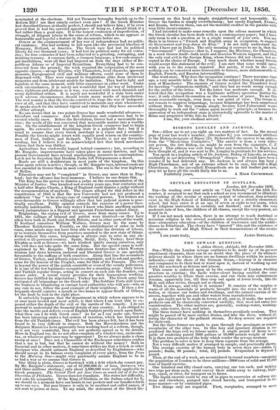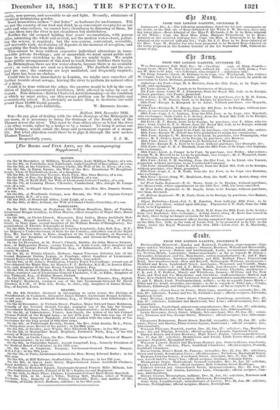THE SEWAGE QUESTION.
1 Adam Street, Addphi, 9th December 1856. Sin—While the London sewage continues to be made up of its present constituent elements, there can be no doubt that the place of its ultimate delivery should be where there are no human dwellings within its noxious influence,—say the shore of the German Ocean,—leaving it to chemists and companies to do their best or worst upon it, instead of washing up and down the sea-beach as flotsom and jetsom.
This course is enforced upon us by the conditions of London dwelling structure as existing; the facile water-closet having enabled the com- parative wealthy to dilute their exuvire, and run them into subterranean streams, apparently lost, till they crop out again at lower levels, like the Mole and other rivers, though not so cleanly. What is sewage, and why is it noxious. It consists of the surplus or waste of all the materials or products brought into the town to feed our bodies, or cleanse our bodies and dwellings, and the animal exuvire of the streets, together with gas and other waters from manufactories. As gas ought not to be made in towns at all, and as, if made, the noxious products can all be chemically converted usefully, that need not enter into consideration. The other matters are, generally, cooking-water, washing- water, rain-water, faces, and urine. The three former have nothing in themselves peculiarly noxious. They might be passed off by mere surface drains, and into the river, without al- tering the character of the pellucid stream. No deep sewers are required for their exit.
But the three former are made to pass through the proximate or remote receptacles of the other two. In this lazy and ignorant dilution is en- gendered the huge evil we labour under. A single pound of hem is ca- pable of rendering putrid 1000 gallons or 10,000 pounds weight of water. It is these two products of the body which render the sewage noxious. The problem to solve is how to keep them separate from the sewage. Not a very difficult matter if arranged in sample, and practically shown. The average excreta) of the human body in seven days are—solids, lf pounds ; fluids, 20 pounds; total, 21i pounds. Evaporated to dryness 1 pound. Thus, at the end of a week, are accumulated in round numbers—assuming the population of London to be three millions-2000 tons of solid and 27,000 tons of liquid excreta. One hundred and fifty closed carts, carrying one ton each, and making two trips per diem each, could convey these solids away to railway, high- way, canal, or river, for transport on to farms. The liquid excreta) could be run off in pipes to reservoirs at railway sta- tions and elsewhere, pumped into closed barrels, and transported in the same manner—or by continued pipes. Two things only are required. First, receptacles, arranged to move easily, non-porous, and accessible to air and light. Secondly, admixture of chemical deodorizing powder.
Good housewives eschew " slut holes" 'as-harbours for uncleanness. Till we put the excretal of our food and drink in as convenient receptacles as our safes and wine-cellars, we cannot have cleanliness in disposing of them, for to run them into the river is not cleanliness but sluttishness. Neither the old cesspool. holding four years' accumulation, with porous sides, saturating the whole soil around, nor the modern water-closet, pollut- big the sewers, is required ; but the non-porous,. convenient, accessible, and moveable tlik, deodorizing all deposits at the moment of reception, and separating the fluids from the solids.
cannot be done without expensive individual alterations in innu- merable private dwellings ; and so meanwhile we must spend public mil- lions in sewers stretching to the sea. But we might begin. We might make public arrangements of this kind to teach future builders their lesson. In Birmingham there are few water-closets, because there is no available river; so coal-ashes are used as a deodorizer. The dusthole and the cess- pool are one • the contents are kept undiluted, and frequently emptied; and there has been no cholera.
Could this be done immediately in London, we might save ourselves all further trouble about sewage, leaving the river to perform its natural office of a drain.
Could it be done without the ashes, the excrette would be left in the con- dition of highly-concentrated fertilizers, little affected in value by cost of transit. Non-dilution-Edwin Chadwick notwithstanding-is the condition at which we must arrive, ere this sewage problem can be thoroughly and economically solved. It is obviously an easier thing to deodorize one solid pound than 10,000 liquid pounds.

































 Previous page
Previous page